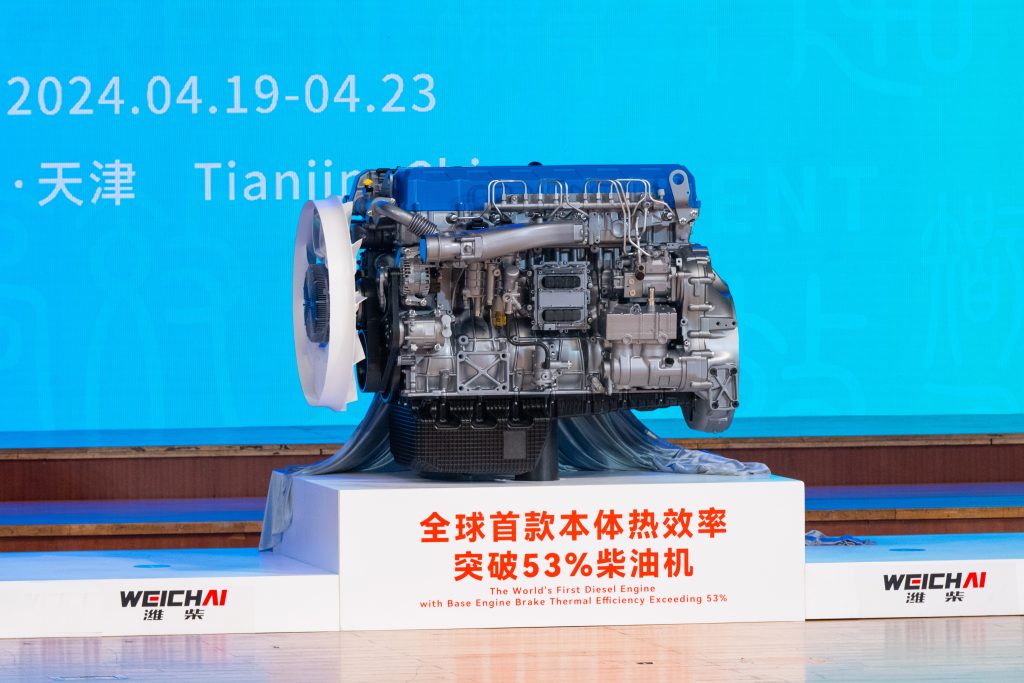Weichai Power Unveils World’s First Diesel Engine with 53.09% Thermal Efficiency
On April 20, 2024, the 2024 World Congress on Internal Combustion Engines commenced in Tianjin, China, marking a pivotal moment for the industry. Weichai Power stole the spotlight by unveiling a groundbreaking achievement: the world’s first diesel engine boasting an intrinsic thermal efficiency of 53.09%.
This remarkable feat garnered official recognition from both TÜV SÜD, an esteemed international testing organization, and the China Automotive Technology & Research Center, a leading testing body for Chinese internal combustion engines. The issuance of product testing reports and certificates by these authoritative organizations affirmed Weichai Power’s establishment of a new world record in the crucial economic index of diesel engine thermal efficiency.
The pursuit of enhancing thermal efficiency in diesel engines has been a lifelong endeavor for scientists and engineers worldwide since the inception of the diesel engine 127 years ago. This intricate challenge not only involves a complex system engineering process but also serves as a litmus test for a nation’s comprehensive strength in internal combustion engine technology. Over time, the quest to improve diesel engine thermal efficiency has remained a persistent international challenge.
Weichai Power’s Technological Advancements
Since 2015, Weichai Power has assembled a formidable research team dedicated to achieving high-thermal efficiency engines, comprising hundreds of young Ph.D. holders and thousands of engineers. This multidisciplinary team has collaborated with leading minds domestically and internationally, along with industry-university-research partners, to conduct cutting-edge technical research and continually push the boundaries of innovation.
Building on its previous successes, Weichai Power’s research team embarked on a focused effort spanning over 500 days to refine four critical systems: combustion, air intake, fuel delivery, and friction reduction. Through innovations such as high-expansion combustion, mixed-flow pressurization, high-efficiency fuel injection, and low-resistance friction-reducing technologies, the team achieved incremental gains of 0.1% at each step. These developments culminated in a groundbreaking milestone: surpassing the 53% thermal efficiency barrier for the first time globally.
This accomplishment is akin to a human running the 100-meter race in under 9 seconds. Alongside technical achievements, the team secured 176 invention patents and 68 utility model patents during the research and development process.
Mr. Dirk von Wahl, CEO of TÜV SÜD North Asia, lauded Weichai’s exceptional achievements via video message, acknowledging their significant impact on the global stage and surpassing current industry standards.
He emphasized Weichai’s robust scientific research capabilities and technical prowess, highlighting the milestone’s potential to support China’s carbon peaking and carbon neutrality goals, green development initiatives, and the sustainable growth, energy conservation, and emissions reduction efforts of industries worldwide.
Based on estimates of Chinese diesel engine ownership, upgrading from a thermal efficiency level of 45-46% to 53% could enhance diesel engine economy by approximately 14%, translating to annual fuel savings of around 31 million tons and a reduction in carbon emissions of approximately 97 million tons. For a heavy-duty tractor traveling 250,000 kilometers annually, this improvement could save roughly 12,000 liters of diesel fuel each year, amounting to an annual savings of about 98,000 yuan for the owner.
This technological advancement extends its impact beyond transportation to various sectors such as construction machinery, agricultural equipment, ships, and power generation equipment, making significant contributions to global economic and social development.

